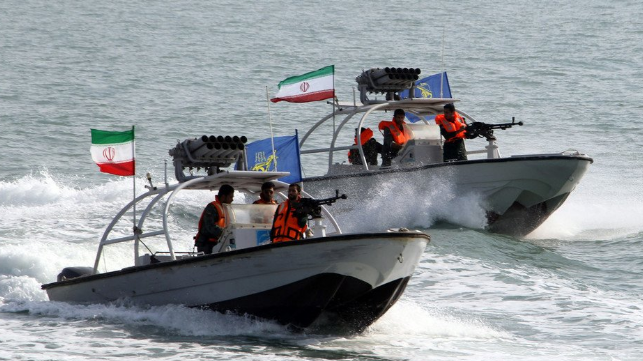Countering Iran in the Strait of Hormuz
"Heightened military activity and increased political tensions in this region continue to pose serious threats to commercial vessels. Associated with these threats is a potential for miscalculation or misidentification that could lead to aggressive actions."
"In at least two of these incidents, vessels reported GPS interference. One vessel reportedly shut off its Automatic Identification System (AIS) before it was seized, complicating response efforts. Vessels have also reported spoofed bridge-to-bridge communications from unknown entities falsely claiming to be U.S. or coalition warships."
U.S. Maritime Administration (MARAD)
 |
The Islamic Republic of Iran brooks no interference in its aspirations to become a regional power, nor its intentions to become a nuclear power. At the same time that Sunni majority regional nations have formed a unified front against Iran's Shiite clique with Saudi Arabia defensive over its accepted role as the commanding senior Middle East nation whose stewardship of Mecca and Medina give it both regional and universal authority, Iran has continued its recruitment of allies in Syria, Iraq, Lebanon and Qatar, while supporting Houthi rebels in Yemen where a proxy war is playing out.
With the Trump administration pulling out of the feeble nuclear agreement with the Republic of Iran, still supported by the EU, and additional sanctions applied to an Iran that the world recognizes for its support of terrorist groups like Hezbollah and Hamas along with its ongoing provocations in missile development and threats to the existence of Israel, Iran's economy has suffered and continues to plummet. An always-irascible Ayatollah-ridden authority has long threatened to disrupt shipping in the Strait of Hormuz.
With the authority given to the Islamic Revolutionary Guard Corps to launch piracy on the high seas tensions continue to build in the water between the Gulf of Oman and the Persian Gulf, which hosts the world's greatest oil shipments with over 15 million barrels of oil passing through the Strait daily heading to all corners of the globe. Iran has seized three tankers in several weeks as they sailed through the Strait, claiming they were in its territorial waters and illegally shipping oil.
 |
| Iran's Revolutionary Guard has released footage showing some of its forces boarding the British tanker Stena Impero in the Strait of Hormuz. Photo: Iranian Revolutionary Guard |
A British tanker among them, in retaliation for an Iranian tanker that was stopped and taken into custody in Gibraltar on British authority carrying contraband oil to Syria, in direct violation of international sanctions placed on the murderous regime of Bashar al-Assad. It's clear enough that the IRGC is conducting acts of intimidation and piracy, another kind of terrorism, which the Supreme Leader, Ayatollah Ali Khamenei claims to be perfectly justified since they're stopping illegal activity.
This is Iran's way of messaging the world that it has options of its own to pursue in retaliation for the sanctions that have been strait-jacketing its economy, causing unrest among the population resulting from the straitening situation of enforced austerity and general insecurity, under perceived threat by the United States. Global markets, meanwhile are reeling in uncertainty over their shipping routes. Vulnerable to strange tanker blasts, or to the potential of being hijacked.
Now reports have emerged from the U.S. Maritime Administration that two incidents have occurred with commercial vessels where ships reported interference with their Global Positioning System along with communications falsely claiming by unknown entities to be from U.S. or other warships, warning the ships not to respond with violence should someone attempt to board them. The contention is that Iran is making use of GPS jammers to target aircraft and ships emanating from an island close to where the Strait of Hormuz begins.
 |
| As tensions between the U.S. and Iran rise, a series of incidents has put a strategic maritime waterway back into the spotlight: The Strait of Hormuz. Photo: Getty Images |
According to the MARAD source, this is an effort to guide these ships by implication to stray into Iranian territorial waters or airspace. At which point they are fair game to be detained by the IRGC.
In the spirit that all is fair in the war of sanctions and guerrilla tactics, Iran-style. What gives Iran breathing room is its association with China, an important client and supporter, as a member of the UN Security Council, and buyer of Iranian oil.
 |
|
|
Labels: Iran, Piracy, Strait of Hormuz, Threats, United States

<< Home